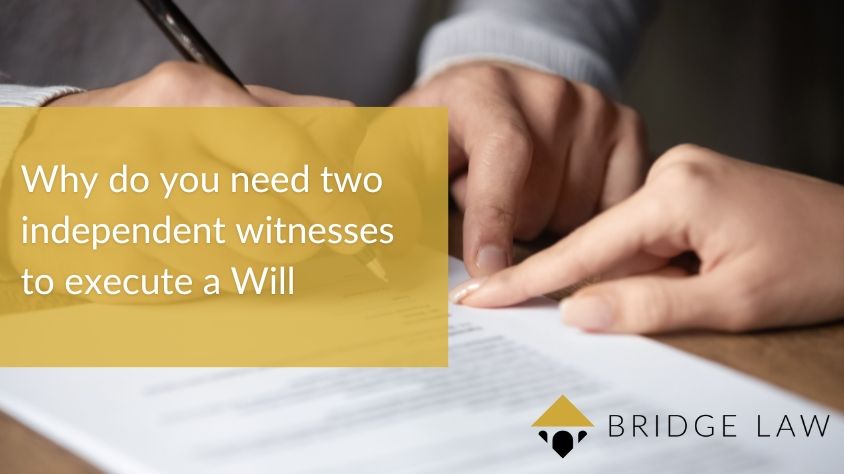Why do you need two independent witnesses to execute a Will

When writing a Will, there are specific steps you need to follow to ensure validity. A critical step in the Will writing process is to have the signing of the Will witnessed – by two independent witnesses. In this blog, we explain the Will signing process and why this step is important.
The proper process for signing a Will
For a Will to be properly executed and legally valid, it must be signed by the person who is making the Will (the Testator) in the presence of two independent witnesses.
It is good practice, to protect from suspicions arising after you pass, for the Will to be signed on each page by the Testator and the two witnesses, with the final page providing the date, full name, addresses and occupation of the witnesses.
To avoid any suspicion over pages fraudulently being changed/added after the Will was made, it is also good practice to straight away make a photocopy/scan of the Will and then store it somewhere safe, such as at a professional Will storage facility for example, with your solicitor – it’s important if you have stapled or fastened the document, that you do not remove any staples or fasteners, as this can raise questions of tampering during probate.
Why it is important to have the signing of your Will witnessed
Following the correct procedure helps to protect somewhat against Wills being made fraudulently or under influence from someone else. Ensuring a Will is witnessed properly helps to protect the Testator’s wishes if any doubts around validity arise – whether that be suspicions over the legitimacy of the Will itself such as whether it is in fact the testator’s signature, undue influence, or doubts about the testator’s capacity at the time they made the Will.
In contentious probate cases, where the validity of Wills comes into question, witnesses can be called upon to provide their version of events and any evidence they have. So, it is a good idea to select independent, trustworthy witnesses who will act in your best interests if a claim is made after you pass.
Who classes as an independent witness?
An independent witness must not be:
- Related to you by blood
- Related to you via marriage
- Be a beneficiary in the Will or a partner of a beneficiary
You also ideally want to choose someone you trust will provide evidence at court in the potential event it is required. It’s also worth choosing witnesses who are not likely to pass before yourself, for example, an extremely elderly or terminally ill person, since, if your Will does come into question – witnesses that are able to provide their account of events may be crucial.
Although this may seem like a lot to take into consideration when making a Will, if you choose to make a Will with the advice and assistance of a professional, they should explain the whole process to you to ensure you fully understand the procedure. If you wish to make a Will with our Wills and Probate team, we can arrange for the witnessing to take place at our offices (or at your home if you are unable to attend the office due to health issues) to ensure the signing is completed correctly.
If you need assistance with making a Will, contact our specialist team today on 0161 427 0084 (Marple Bridge), 01484 442 700 (Holmfirth) or email info@bridgelawsolicitors.co.uk.
Written by Carol-Anne Baker

Estate Planning, inheritance, Inheritance Planning, Probate, Will Writing, Wills, Wills and Probate
